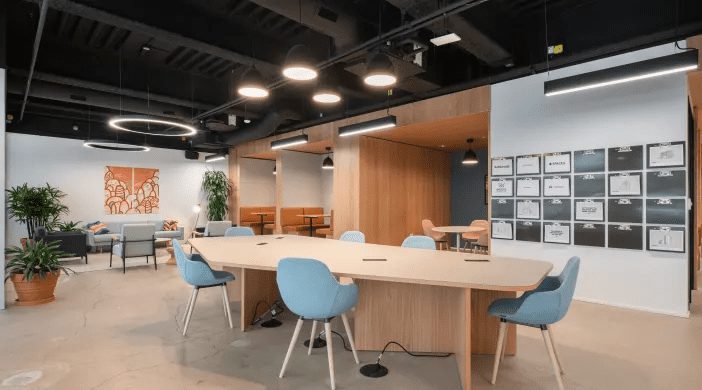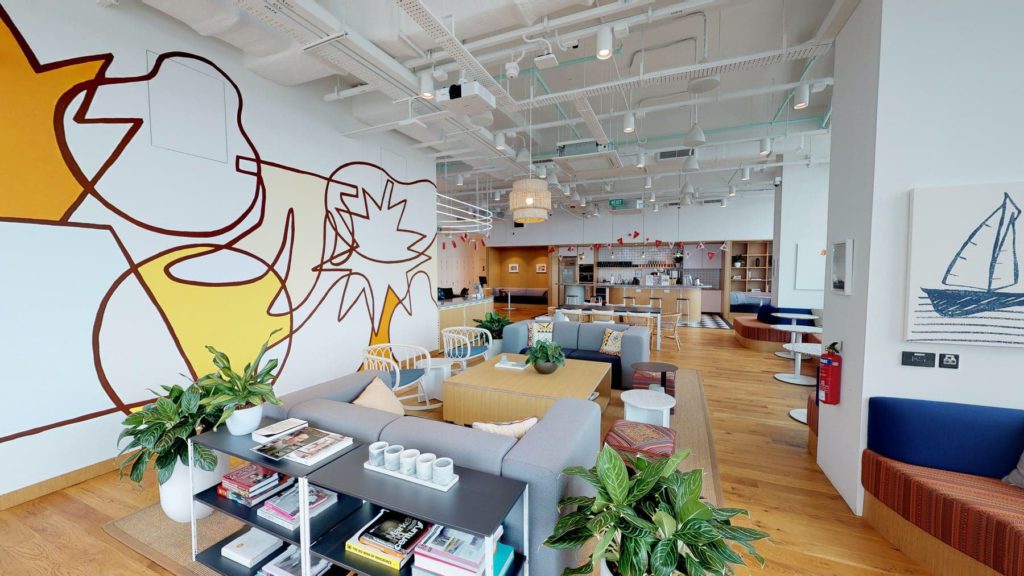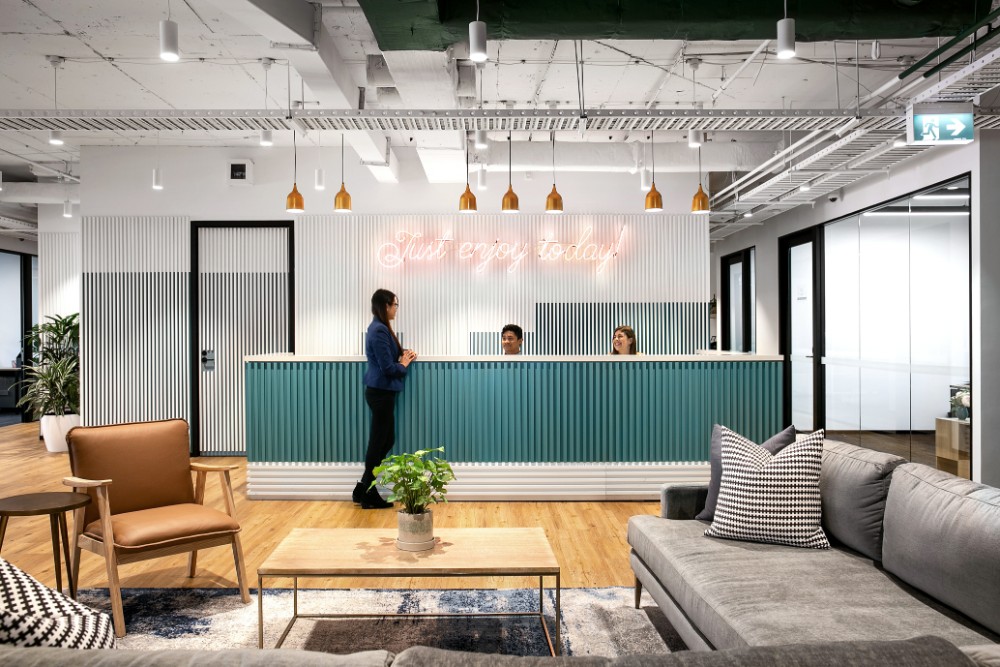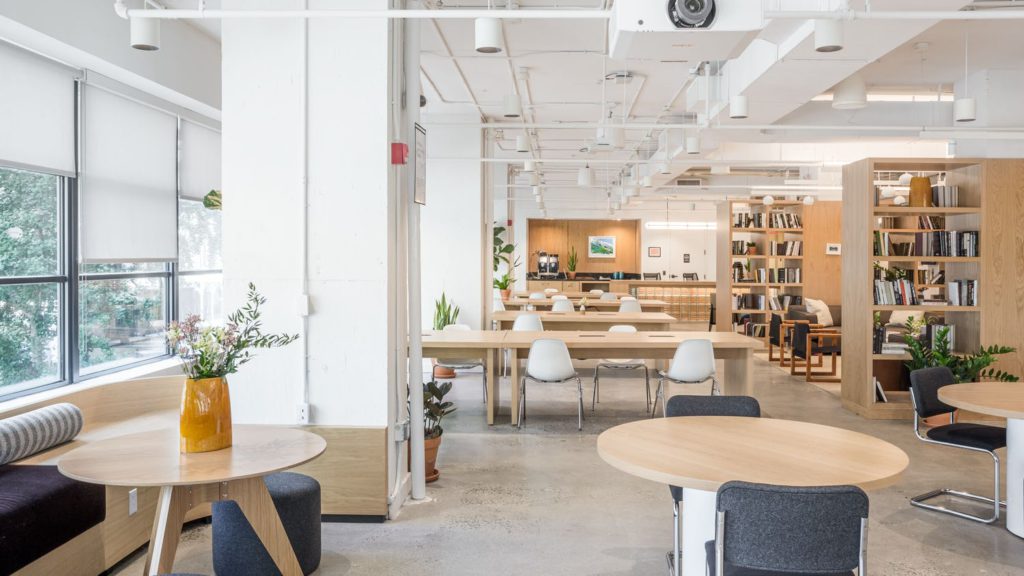
Factors Affecting the Coworking Industry
With the coworking space market on an upward trend, it’s no surprise that providers are stepping up their game to retain customer loyalty. As they vie for a larger piece of the pie, tenants can not only look forward to more affordable rates but also greater access and variety of services/amenities; all ideal components in establishing our ‘new normal’ when it comes flexible workplace options post pandemic.
Coworking Space Rates
With competition intensifying and people re-thinking how they work, providers are likely to be more cost conscious with their services as a means for attracting new customers. As such, we can expect an influx of budget friendly options that cater to different tiers; from luxury packages down to average or ‘budget’ prices – opening up this once out-of-range offering for companies looking for far cheaper alternatives compared to traditional office space rental rates.
Virtual Work Environments
Working from home has become a necessity in the era of COVID-19, but many people lack access to an environment conducive for telecommuting. Fortunately, coworking spaces have risen up as key players to help solve this problem by offering virtual memberships tailored specifically towards remote workers.
As pandemic safety measures relax we expect that those who prefer office space will return to traditional coworkers and use their new acquired skills with online amenities associated within them such as video conferencing or specialized applications geared towards work efficiency demands while also getting all other perks offered inside these unique offices!.
Health and Safety
Coworking spaces are taking additional steps to ensure the health and safety of its members. Enhanced cleaning regimens, increased sanitisation stations and strict social distancing guidelines provide a safer environment for workers who can’t or don’t want to work from home. To further boost sanitation efforts, some providers have even implemented innovative technologies like HVAC units with air purification filters as well as UV light sterilization systems – ensuring long-lasting peace of mind in this post pandemic era.
Specializations for Niche Markets
Working from home has become more popular than ever, prompting many people to search for workspace solutions beyond the traditional office. Enter coworking spaces – places tailored specifically towards remote workers looking for collaborations and support in an open-minded professional environment.
Recently, these shared offices have started exploring their niche markets by creating specialist services that cater to specific industries such as music production or tech start ups; giving customers access to a unique package of specialized amenities at each location.
Expanded Clientele
As the trend of coworking spaces grows, businesses are increasingly turning to them as an attractive and cost-effective way to get their employees access to top quality amenities without having the overhead or responsibility that comes with renting out a commercial office. This has created new opportunities for brokers offering services in finding ideal shared workspaces – enabling companies not only save on costs but also benefit from full service facilities at these locations.
Coworking Partnerships
The pandemic has opened up a new field for hotels and restaurants around the world who, facing decreased customer numbers, are serving as pioneers in transforming their establishments into coworking spaces. Accor Hotels in France set off this trend by blending hospitality with flexible workplace options to truly provide an innovative workspace experience – from lobby workstations to offices within hotel rooms. Restaurants too have not been left out; taking advantage of lower capacity restrictions or dinner-only operations many eateries now offer customers more than just great food but also a unique place to get down business while enjoying some culinary delights at the same time.
There’s a growing demand for flexible workspaces.
According to WFH Research’s survey of 5,000 Americans, employees want to work from home three days per week on average, primarily to reduce commute time and limit human interactions for health and safety reasons. Furthermore, more than a quarter of those polled stated that they would only accept a future job if it were close to their home.
- Freelancers continue to dominate as the most common type of worker to use coworking spaces, accounting for almost 41%
- 59% of workers say human interaction is one of their top considerations when choosing a coworking space.
- 59% of workers seek 24/7 access from a coworking space.
- 65% of people who use coworking spaces globally are under 40.
Major Coworking Space Players

Regus Corporation and WeWork are the two major players in leasing office space, with Regus taking 11% of the market share. The European company operates across 900 cities spread over 128 nations, while WeWork has a presence in 77 urban areas around 23 countries globally. Not just coworking spaces, they also offer virtual offices, meeting facilities, day offices and business centres to cater to professionals who may require a workspace but do not have an accessible place near them. (Statista 2021). After Regus, there’s WeWork, Premier Workspaces, Knotel, Kr Space Coworking, and District.
Singapore Coworking Space Market
Since 2015, the number of coworking spaces in Singapore has tripled, and flexible office space accounts for 4.2% of all office space in the country.
Large corporations in Singapore and the APAC region have reported saving millions of dollars by going remote and eliminating the need to pay for office space. Employees who work remotely have also saved money on transportation and other miscellaneous expenses.

- The majority of coworking spaces in Singapore are provided by seven (7) coworking space providers, with WeWork leading the pack (22%) and IWG (Regus) a close second (16.6%).
- The majority of coworking spaces in Singapore are located in major city centres. This includes Raffles Place and New Downtown, which account for 52% of the city’s coworking spaces, followed by Shenton Way or Tanjong Pagar, which account for 12%. The remaining coworking spaces are located at City Hall and Orchard Road.
- The average desk price in Singapore is $SGD550 and is expected to rise by $SGD575 in 2023.
Australian Coworking Space Market
Despite rising real estate prices across the country, coworking spaces are an affordable option for businesses. Especially after the potential loss of business during the pandemic’s peak, providing employees with coworking space access is a natural progression into the new world of work.

- Banking and finance organizations are the most common type of business that uses shared office space and coworking spaces, accounting for 27% of all companies that use coworking space. This is followed by IT (18.13%), Professional Services (22.20%), and Real Estate (10.05%).
- Almost three-quarters of businesses (72%) that use coworking spaces choose the private office option. Only 13% prefer coworking desks.
- The average desk price in Australia is $AU550 and is expected to rise by $AU600 in 2023.
US Coworking Space Market

- Regus (IWC) and WeWork are the top coworking space providers in the United States. However, in 2021, the top coworking companies in the United States will also include Impact Hub, Your Alley, Knotel, District Cowork, Industrious Office, Serendipity Labs, Green Desk, and Spaces.
- Some of America’s largest corporations are also using coworking spaces. Some of the largest companies that use coworking spaces are Apple, Facebook, Alibaba, Microsoft and Samsung.
- According to Statista, the average monthly desk price at coworking spaces in the United States was $855.
The Future of Coworking
As the coworking space trend surges, these are the trends that we can expect in the coworking space industry:
- Specialization – A whole range of industry-specific offices and niche workspaces will be popping up soon as businesses strive for differentiation within this booming market.
- Health Protocols – Working in a coworking space is likely to remain different for the foreseeable future, with COVID-19 health and safety precautions becoming part of everyday life. From sanitation stations to improved air filters – businesses are taking every precaution they can think of to make sure everyone feels secure while working together.
- Technology – Coworking spaces are poised to make a big leap forward into the future thanks to technological advances. Automated access cards, apps for managing space and services, booking systems, attendance registers and time trackers will all help reduce on-site required resources whilst offering better amenities than ever before.
- Multi-City Locations – In the present climate of modern working, more and more people require flexibility when it comes to choosing their office space – coworking companies have answered this call by providing members with access to quality workplaces near them.
- Improved Design – Architects and interior designers will continue to play an essential role in creating productive, comfortable workspaces. Workers have come to expect ergonomic furniture and stylish interiors.
- New Amenities – As coworking space providers face a rising competitive climate, we can expect to see incredible new benefits arising in the industry. Companies will soon provide awesome extras like babysitting services for busy parents or professionals; direct access to chartered accountants and loans from banks; plus business accounts tailored just for them.
- Sustainability – It’s becoming increasingly important to stay ahead of the competition by offering sustainability features. In fact, observers predict that sustainable practices will become a standard in the near future if businesses don’t want to get left behind.
- Affordability – With so many new players joining the coworking space market, memberships may become more accessible and catering to a wider variety of budgets. We are likely to see an emergence in tiers ranging from budget-friendly options, middle range selections and luxury levels – each targeting various segments of the population.
- Corporate Shift – The future of coworking space will be dominated by corporate clientele. Though it started out as a haven for freelancers and entrepreneurs, businesses are now taking advantage of collaborative remote working opportunities afforded by these spaces – some even setting up their headquarters in them. With such advantages over traditional office setups becoming more apparent everyday, it seems that companies from all industries will be jumping on board this trend soon enough.
2023 Coworking Space Report
osDORO surveyed coworking spaces in 2022. clients, as well as aggregated property data on commercial real estate. The outcomes were gathered and summarized, supplying data and projections for 2023 and beyond. An additional review of literature, market research, and business research was conducted to provide more data analysis on the state of the coworking space market.
A survey of over 300 global coworking customers allowed for varied responses. According to the result, people prefer coworking spaces only second to working from home. The customers were then divided into groups according to their respective geographical areas. As the world continues its post-pandemic re-opening efforts, this trend will likely shift toward coworking spaces.
Read the full coworking space market report below.
Coworking Space Market Report 2022-2023 – Coworking Space Trends, Analysis, and Stats

Enterprise software development experience. More recently in positions including CTO, Lead Developer and Head of Product in Australia. Deep expertise in property and legal technology in Australia with a specialty in lead generation and tech scalability across Asia-Pacific.